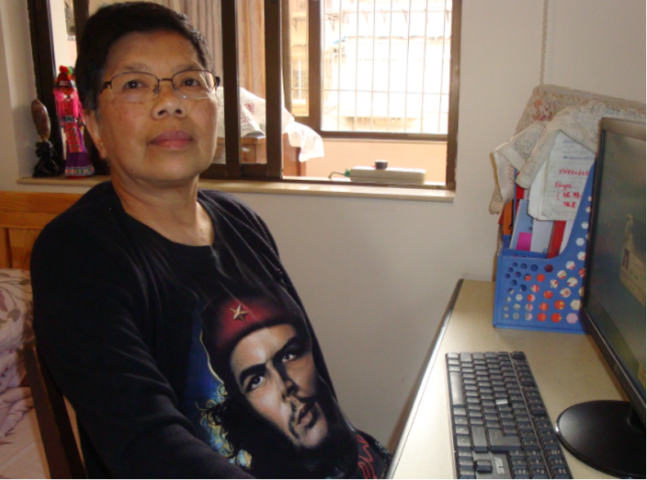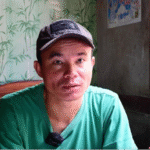An interview with China-based political analyst Dr. Hla Kyaw Zaw
Dr. Hla Kyaw Zaw, a China-based political analyst, was interviewed by Narinjara News to get her views on the meetings of Mr. Deng Xijun, the Special Envoy for Asian Affairs of the Chinese Ministry of Foreign Affairs, with Myanmar military council chairman Min Aung Hlaing and Northern Alliance leaders.
Q: First of all, China’s special envoy for ASEAN affairs, Deng Xijun, met with Myanmar’s military leadership in Nay Pyi Taw in late December last year. He came to Myanmar for the second time in early March this year. I’d like to know what is the purpose of appointing a special envoy for Myanmar affairs. How do you see it?
A: Let me explain. The Chinese government has been talking about wanting an end to the civil war for a long time. Just as the ethnic armed groups operating on the border in this 70-year-old civil war cannot fight an urban welfare, the Myanmar military, which has heavy weapons that it can use to its advantage, can’t defeat the ethnic armed groups in the jungle. They have reached an impasse, so to speak. If the civil war, which has been going on for 70 years, continues like this, Myanmar will be a failed state. If it becomes such a state, it might not be Myanmar alone, but could drag other countries down with it. That is why they [China] have long been urging organizations with good intentions toward Myanmar, such as the United Nations, ASEAN, and some other key neighbors, to work toward dialog to end Myanmar’s long-running civil war.
China has been saying that since the Kokang conflict in 2015, which flared up again for the second time. I think this is a continuation of that. It’s a hot spot. It’s not unusual to have a special envoy in a country that is in the midst of a burning civil war. They’re involved in mediation in some ways. I don’t know if you have heard that even Saudi Arabia and Iran are going to establish diplomatic relations again. China has gotten involved in the case. So there are many other things that are similar. For example, China has intervened in Sudan and some other African countries. China has also helped in Somalia to alleviate the grief in Somalia. So in China’s eyes, Myanmar is a very important neighbor. This is because China borders Myanmar for a length of more than 3,000 kilometers. Since there are many armed groups along this long border, China wants to make it as peaceful as possible. Only then can it realize its strategic goals such as the Belt and Road Initiative and the ASEAN-China Free Trade Area. So I think China is acting as a mediator between the Myanmar military and the armed groups on the border. They have been doing that for many years. We can see it because it’s our country’s affairs. But these Chinese ambassadors are also active in other countries.
Q: Yes, as you just said, our country hasn’t enjoyed peace for 70 years. Although China has actively participated in the internal peace process, the armed conflict with the armed ethnic groups hasn’t ended. China has in some ways supported these groups and maintained its influence over them. So I wonder if China has fire in one hand and water in the other in this case. I wonder if China actually wants peace in Myanmar. How would you assess that situation?
A: Well, let me explain. Big countries have big strategies and different kinds of tactics. As you said, they can support with other means. But we can see what China is doing for Wa and Mongla regions. As long as they peacefully strive for economic prosperity, China has helped them develop into regions where people can live in peace and prosperity, no matter how backward and remote they were. That is why they have invested in the Wa and Mongla regions. China is helping them in the health sector. Just as they’re helping to improve education while making investments, it seems that the Myanmar side is also making corresponding efforts. But given the situation, unilateral efforts by China won’t bring significant progress. Since the military council is brutally torturing people, they also have to deal with the situation that people are in. As for me, I see that China’s policy has changed to some extent. I think they’re no longer using all their resources for the regime, as they did in the days of the SLORC and the SPDC, but they’re trying to win over the military council by tricks. As for communicating with the military council, if they use strong rhetoric like the U.S. and Western countries, no one will listen to them. Therefore, I think China is trying to be nice and ensure smooth interaction.
Q: Yes. We also know from the ethnic armed groups that the Arakan Army (AA) has good relations with China. China has made a lot of investments in Arakan. For example, the Kyaukphyu SEZ and the gas pipeline. So what is China’s position on AA?
A: AA has been open about it. They have said that they’d protect Chinese interests. It’s not just AA, as I assume. Just look at the situation yourself. China’s investment is substantial. No one is interfering or sabotaging them. In the early days of the coup, some Chinese factories in Hlaing Tharyar were destroyed. China believes this was done by members of the military council’s intelligence service. Now the garment factories in Hlaing Tharyar have solved many unemployment problems. Both the public and armed groups like the PDFs and other groups seem to understand this situation. They can say very bad things about China if it pleases the U.S. and Western nations. But in practice, they don’t. That’s why the AA has also openly said that they’ll not touch the Chinese interests. It’s not just China’s, India’s investments are there too. That’s what Myanmar’s economic situation is right now. We can’t touch them because their investments are helping the people of Myanmar to make a living. But what the people of Myanmar have to remember is that we can’t achieve peace or economic development with the military council. Only when the military dictatorship is overthrown will our country achieve real peace and development. In the meantime, we may have to allow some things to happen in the short term to ensure the well-being of the people. But our people know best what they want in the long term. We can’t afford to slow down this revolution. We must continue it in every possible way. So the AA has agreed to a ceasefire with the military council, but it’s up to them as an organization to decide. They have to look after the interests of their region. But AA isn’t oppressing people by working directly with the military council. We have to understand that. That’s why we have to fight the military council with all possible means. If some groups want to find a solution through negotiations, let them do so. Those who believe in armed resistance should continue on their way. There are people who have joined the CDM as part of the revolution; and some have chosen to be part of the urban guerrillas. We have to use all kinds of means. We don’t have to consider anyone or any group as an enemy who opposes the military council, just because they do it in a different way. That the military council or dictatorship has survived for so long is due to the lack of unity among our revolutionary forces fighting against the military dictatorship. This military dictatorship will surely collapse if just 1 or 2 percent of the people who reject it come together and fight. Never before has our country seen such a good momentum of revolution. The prospect of this revolution is tremendously good. We just have to do what we have to do.
Q: Yes, on the next question, the visits of the Chinese special envoy to Myanmar have become more frequent. Last month, the Chinese foreign minister also visited Indonesia, which holds the ASEAN chairmanship on a rotating basis. That is where ASEAN has its Five-Point Consensus. He said China accepts the Five-Point Consensus. Although China has good relations with Myanmar, China-ASEAN relations are strained, which China has to accept. We think China has a different approach to the issue. What do you think about that?
A: The Five-Point Consensus says that all parties in Myanmar must seek a solution through talks and negotiations. That’s exactly what the Chinese special envoy is doing. He’s trying to mediate as best he can between the military council and the resistance groups. That is just part of trying to bring all the groups to the negotiating table. I don’t see anything special in that. The goal of this whole strategy is to bring them all together. It’ll be bilateral before all these groups can’t be brought together.
For example, any situation between the military council and the Wa, the military council and the Mon group, and the military council and the Karen group. They’re just trying to accomplish small things between these groups. So even though ASEAN has developed a great strategy, the Chinese special envoy is working with each group individually. I don’t know if you noticed that. After meeting with each group, the Chinese special envoy comes back with records of each group’s demands, understanding, and needs. Then he might have negotiated with the military council. I think that is part of the strategy to bring all the groups together. Before they can have a big, all-inclusive conference, I think he holds small meetings between just two or three groups.
Q: Currently, the PDFs have also joined forces with the EAOs. The military regime has invalidated the NLD election results, arrested and gaoled the government leaders, including Daw Aung San Suu Kyi. As you said, the Chinese special envoy is currently meeting with all the parties. Is there any possibility that he can also meet with Daw Aung San Suu Kyi as part of the Chinese mediation efforts? What are your thoughts on that?
A: That is likely. Because before the current special envoy, there was a Chinese special envoy named Sun Guoxiang. Shortly after the military took power in a coup, Sun Guoxiang travelled to Myanmar. The very first person he wanted to see in Myanmar was Daw Aung San Suu Kyi. Also, there were rumours that the military council even wanted to declare the NLD an illegal organisation. China somehow didn’t allow that to happen. The military council won’t negotiate with anyone as long as they think they’re in power. They’ll not negotiate with Daw Aung San Suu Kyi either. We, the people, need to know that. We must put more and more pressure on the military council. If we keep doing that, one day they’ll inevitably come to the negotiating table.
Q: With Sun Guoxiang, there have been two Chinese special envoys to Myanmar, but the armed conflict has intensified greatly in the past two years since the military coup. Sagaing and several ethnic areas have been severely affected by the war. How do you assess the current political situation? Is it optimistic?
A: When we talk about how to change the political situation in Myanmar for the better, it’ll only be possible if the military council changes its way of thinking and gives up its monopoly over political and economic power. Only then will our revolution be successful. When will they give in? They’ll give in when they feel that the people of Myanmar are totally against them and will push them off the throne. For that to happen, we still have to do many things. The people of Myanmar are right. We’re also tired of the revolution. We don’t want to do this. But we can’t afford to remain idle. We have to continue as long as the military regime exists. We have to understand that.
If we want our children and grandchildren to be free from the military dictatorship, we must have the courage to sacrifice everything and keep going. The revolution will probably be fierce. We’ll have to do that. Our revolution can’t succeed unless the military gives up the privileges they enjoy. That is why I want to encourage the people to continue the revolution together. We must do this together. All forces, including armed groups, at home and abroad, will have to keep trying. This revolution will continue to be difficult.
Q: What would you like to add about the Chinese special envoy’s efforts to mediate in the political crisis in Myanmar?
A: Whether it’s big neighbouring countries or ASEAN, their plans will always depend on their country’s interests. But we should be grateful to all who are exerting international pressure, whether it’s the secretary general of UN or the representative of UN. But maybe we can’t do exactly what they say. Just as they say that there is no negotiation in a blood feud when it comes to overthrowing the military council, the people of Myanmar will have to continue that. International representatives visit us, but we ourselves must continue our own revolution. That is all I want to say for now.
Sent by Narinjara News.



